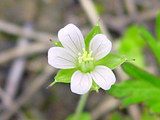Native Plants

Q. Who is Mr. Smarty Plants?
A: There are those who suspect Wildflower Center volunteers are the culpable and capable culprits. Yet, others think staff members play some, albeit small, role. You can torture us with your plant questions, but we will never reveal the Green Guru's secret identity.
Did you know you can access the Native Plant Information Network with your web-enabled smartphone?
Ask Mr. Smarty Plants is a free service provided by the staff and volunteers at the Lady Bird Johnson Wildflower Center.

rate this answer
Monday - June 03, 2013
From: Pittsburgh, PA
Region: Mid-Atlantic
Topic: Shade Tolerant, Trees, Wildflowers
Title: Plants for the Shade of a Pine Tree in Pittsburg
Answered by: Anne Van Nest
QUESTION:
I live in Pittsburgh, PA. My neighbor has a huge pine tree. Last year everything I planted on that side near the tree died. That part of the yard only gets morning sun, as the tree overshadows it. What can I plant on that side that will survive being near the tree? I love lots of color.ANSWER:
The first place to go to find a list of potential plants is our Native Plant Database. Use the Combination Search feature instead of Recommended Species. This will provide a bigger selection with much more choice to narrow down. The volunteers and staff at the Wildflower Center who maintain the database have partners in different regions to help with these recommended species lists based on what is easy to access in local nurseries.
Under Combination Search, select the following categories: State – Pennsylvania, Habit – herb, Duration – all durations, and Light Requirement – part shade and shade. This will give you a very large list of potential plants. You will have to narrow down this search further by indicating search criteria specifics for your soil moisture (is it dry under the pine tree?), lifespan (if you just want perennials), blooming time, height, and bloom color.
Some potential plants to consider include:
Geranium carolinianum (Carolina geranium)
Geranium maculatum (spotted geranium)
Helianthus divaricatus (woodland sunflower)
Helianthus strumosus (paleleaf woodland sunflower)
Lysimachia ciliata (fringed loosestrife)
Monarda didyma (scarlet beebalm)
Monarda fistulosa (wild bergamot)
Oenothera biennis (common evening primrose)
Penstemon digitalis (Mississippi penstemon)
Phlox divaricata (wild blue phlox)
Rudbeckia hirta (black-eyed Susan)
Solidago nemoralis (gray goldenrod)
Symphyotrichum novae-angliae (New England aster)
From the Image Gallery
More Wildflowers Questions
Planting fields with wildflowers
November 05, 2009 - I'm hoping to seed a few fields (large area, short grass) the easiest way possible. I'd love to do bluebonnets but I don't think I can get a large aerator to the locations. Basically I'm wonderi...
view the full question and answer
When to mow after bluebonnets bloom in Brenham, TX
May 04, 2009 - I live in Brenham, TX, and thanks to spreading 80 pounds of bluebonnet seeds last fall, we had a very small but promising showing of bluebonnets this March and April. The bluebonnets still appear to b...
view the full question and answer
Healthy native plants supporting local economy from Tacoma Park MD
February 17, 2012 - I am collecting information on how healthy native plant communities can support the local economy. Do you think the Texas bluebonnets are a good example of this in Texas? For example, do you know ma...
view the full question and answer
Less Maintenance Plant Suggestions for New Raised Bed in Henderson, NV.
April 03, 2014 - We have a newly constructed raised garden bed. I was wondering what kind of plants would be appropriate to plant this springtime in Henderson, NV with less maintenance because I work full time.
view the full question and answer
Transplanting wildflowers slated for destruction in Buda, TX.
June 16, 2015 - TXDOT has recently informed our church that they will be taking a sizeable amount of natural area fronting a ranch road for lane expansion. We are devastated to lose an are we have planted and nurtur...
view the full question and answer
| Support the Wildflower Center by Donating Online or Becoming a Member today. |

